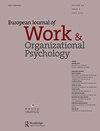边界管理偏好对工作-非工作政策有效性的影响:“关闭”是解决方案吗?
IF 3.4
2区 心理学
Q2 MANAGEMENT
European Journal of Work and Organizational Psychology
Pub Date : 2022-12-28
DOI:10.1080/1359432X.2022.2161371
引用次数: 1
摘要
摘要边界管理偏好如何影响工作-非工作政策的有效性?基于BM和人-环境适应理论,我们研究了非工作时间与工作相关的沟通限制对政策满意度、组织承诺、情绪衰竭和工作投入的影响。我们提出了一个有调节的中介模型,假设沟通限制和BM偏好之间的相互作用预测了感知到的BM拟合,对结果产生了积极影响。我们使用实验性渐晕研究(研究1,N = 257)和相关研究(研究2,N = 239)。这两项研究的结果都表明,工作-非工作政策对政策满意度、组织承诺、情绪衰竭和工作投入的间接影响(仅在研究2中进行了调查)是通过感知的BM适合度和BM偏好来调节的。具体来说,限制与工作相关的沟通只会让喜欢低融合水平的员工受益。相反,喜欢高度一体化的员工不会从该政策中受益。由于使用了两项方法不同的研究,这些发现基于具有高度内部和外部有效性的数据。特别是,研究1中的实验方法允许对沟通限制的影响进行因果推断,支持BM拟合的文献,并提供实际意义。本文章由计算机程序翻译,如有差异,请以英文原文为准。
The influence of boundary management preference on work–nonwork policy effectiveness: Is “turning off” the solution?
ABSTRACT How does boundary management (BM) preference influence the effectiveness of work–nonwork policies? Drawing on BM and person–environment fit theory, we examine the effects of off-hours work-related communication restriction on policy satisfaction, organizational commitment, emotional exhaustion, and work engagement. We suggest a moderated mediation model, assuming that the interaction between communication restriction and BM preference predicts perceived BM fit, positively affecting the outcomes. We investigated this assumption using an experimental vignette study (Study 1, N = 257) and a correlational study (Study 2, N = 239). The findings of both studies show moderated indirect effects of the work–nonwork policy on policy satisfaction, organizational commitment, emotional exhaustion, and work engagement (only investigated in Study 2) via perceived BM fit and conditional on BM preference. Specifically, restricting work-related communication only benefits employees preferring low levels of integration. Contrarily, employees who prefer high levels of integration do not benefit from the policy. Due to using two studies with different methodological approaches, these findings rest on data with high internal and external validity. In particular, the experimental method in Study 1 allows for causal inferences on the effects of communication restriction, supporting the literature on BM fit and offering practical implications.
求助全文
通过发布文献求助,成功后即可免费获取论文全文。
去求助
来源期刊
CiteScore
8.00
自引率
2.30%
发文量
40
期刊介绍:
The mission of the European Journal of Work and Organizational Psychology is to promote and support the development of Work and Organizational Psychology by publishing high-quality scientific articles that improve our understanding of phenomena occurring in work and organizational settings. The journal publishes empirical, theoretical, methodological, and review articles that are relevant to real-world situations. The journal has a world-wide authorship, readership and editorial board. Submissions from all around the world are invited.

 求助内容:
求助内容: 应助结果提醒方式:
应助结果提醒方式:


